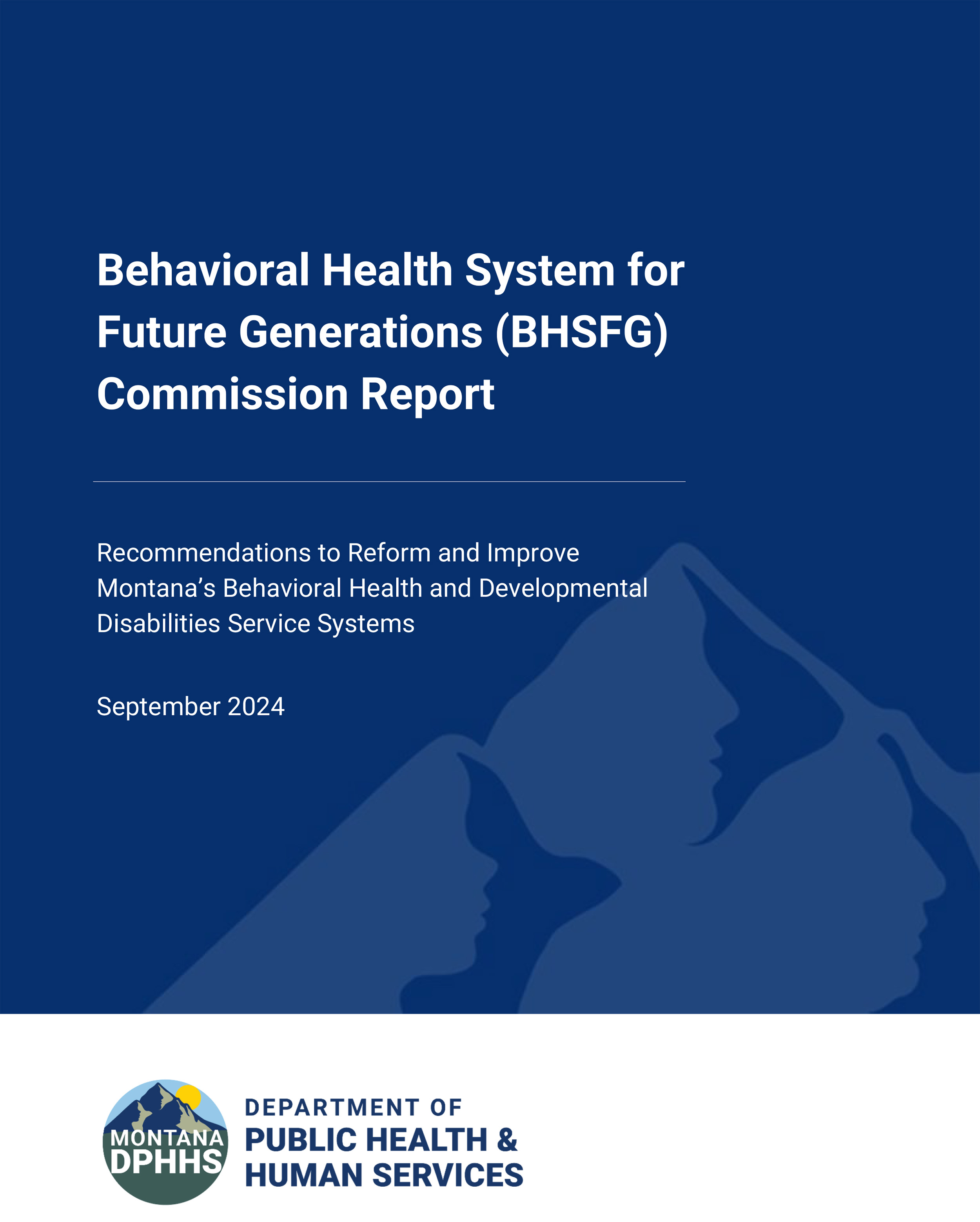Behavioral Health System for Future Generations

On May 22, 2023, Governor Greg Gianforte signed House Bill 872 into law, initiating a $300 million generational investment to reform and enhance Montana's behavioral health (BH) and developmental disabilities (DD) service systems.
This core component of the governor's Budget for Montana Families aims to expand intensive and community-based BH and DD services statewide. Starting July 2023, the Behavioral Health System for Future Generations
Commission held 12 public meetings across Montana over 14 months, gathering extensive testimony from stakeholders, individuals with lived experience, and subject matter experts.
This input shaped their final report, presented to the governor in September 2024. As mandated by HB 872, the report details recommendations for these historic investments, including 22 recommendations and 11 Near-Term Initiatives (NTIs).
Governor Gianforte included 10 recommendations in his 2027 biennium budget, and the legislature provided funding for all of the proposals. DPHHS is now working diligently to implement the recommendations.
Previous Commission meeting materials and locations are available here.
Contact for this Project:
Brett Carter
Brett.carter2@mt.gov
Frequently Asked Questions
The Behavioral System for Future Generations Commission was active from July 2023 to July 2025. The commission members consisted of the bill sponsor, three members appointed by the governor, and five legislators from committees outlined in House Bill 872.
The commission members who served are as follows:
Rep. Bob Keenan, R-Bigfork; Charlie Brereton, Director, DPHHS; Patrick Maddison, CEO, Flathead Industries; Janet Lindow, Executive Director and Co-Founder, Rural Behavioral Health Institute; Rep. Michele Binkley, R-Hamilton; Rep. Mike Yakawich, R-Billings; Rep. Dave Fern, D-Whitefish; Sen. John Esp, R- Big Timber; and Sen. Ellie Boldman, D-Missoula.
The commission was charged with recommending how funds allocated to DPHHS through the behavioral health and developmental disabilities state special revenue fund are to be expended.
Beginning in July 2023, the Commission spent 14 months hosting 12 public meetings in Missoula, Kalispell, Billings, Havre, Helena, and Great Falls, before submitting its final report to the governor in September 2024.
House Bill 872 transferred $300 million dollars from the state general fund to a state special revenue fund titled the Behavioral Health System for Future Generations (BHSFG) Fund. The money will remain in that fund until expended on authorized activities during an approved timeframe.
Pursuant to House Bill 872, the Behavioral Health System for Future Generations Fund can be used for:
- studying and planning of the development of a comprehensive behavioral health system;
- statewide community-based investments to stabilize behavioral health and developmental disabilities service providers and delivery, increase and strengthen the behavioral health and developmental disabilities workforce, increase service capacity to meet identified behavioral health and developmental disabilities services demands, and increase opportunities for Montanans to receive integrated physical and behavioral health care;
- acquisition of new or remodeling of existing infrastructure or property to support the establishment of behavioral health settings and intermediate care facilities for individuals with intellectual disabilities;
- planning, operation, or other contract expenses associated with intermediate care facilities for individuals with intellectual disabilities;
- planning, operation, or other contract expenses associated with behavioral health settings;
- Medicaid and CHIP matching funds for payments made to behavioral health settings; and
- Medicaid and CHIP matching funds for payments made to intermediate care facilities for individuals with intellectual disabilities.
Introduced by Governor Gianforte in his first week in office, the Healing and Ending Addiction through Recovery and Treatment (HEART) Fund supports a full continuum of substance abuse prevention and treatment programs for communities.
While separate from the HEART Fund, the Behavioral Health System for Future Generations (BHSFG) Initiative also represents the Gianforte administration’s strong commitment to addressing the challenges plaguing Montana’s behavioral health and developmental disabilities service delivery systems.
Workstreams associated with the HEART Fund, including negotiating and finalizing the HEART 1115 Waiver, will continue separately from the BHSFG Initiative. Nothing, however, precludes the BHSFG Commission from discussing or considering HEART-related activities. Furthermore, HEART Fund resources are entirely separate from BHSFG funds authorized by the 2023 Legislature.

